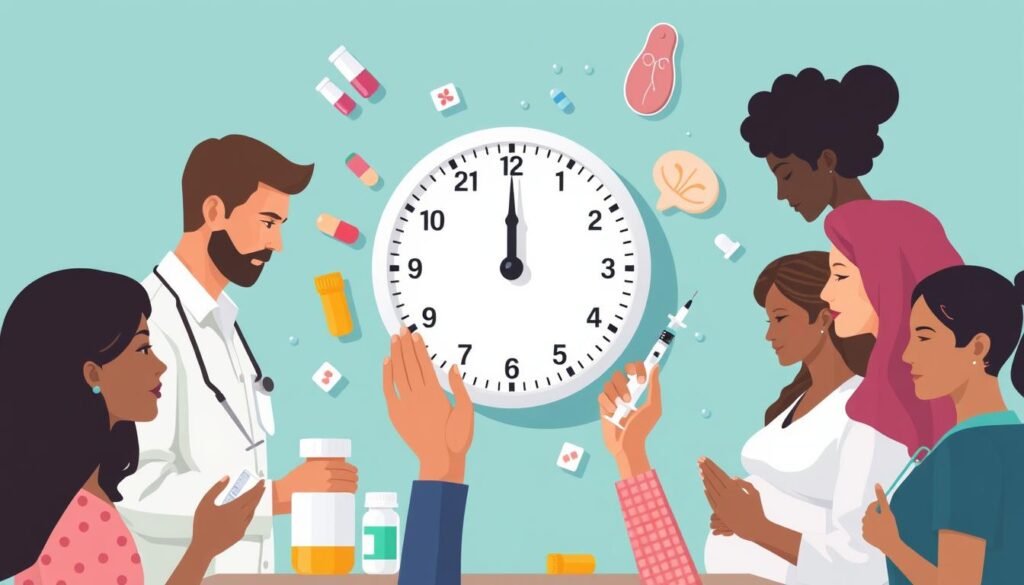Did you know more than 20% of U.S. adults over 40 take five or more medications? Given this, adjusting dosage and timing is crucial. This ensures treatment plans are tuned right and patient responses are properly considered. Unfortunately, the usual approach doesn’t always account for everyone’s unique body differences. That’s why tailor-made medication strategies are so important.
Healthcare providers encounter many hurdles in managing treatment success. They need to check how each patient is doing with their drugs, to make smart adjustments. Working together with other medical pros is key, forming a strong team for managing meds. We’ll explore the importance of changing doses to get the best outcomes for people.
Key Takeaways
- Over 20% of adults over 40 in the U.S. take multiple medications.
- Medication adjustments are essential for optimizing treatment plans.
- Collaborative care helps in making informed dosage decisions.
- It is vital to communicate with all healthcare providers about medications taken.
- Effective medication management can prevent adverse interactions.
- Using tools like pill organizers can simplify medication management.
Understanding the Importance of Dosage Adjustments
Dosage changes are key to safe and effective medicine use. Finding the right mix of drug, timing, and patient is crucial. If the dose is wrong, it can cause too little or too much effect. Too little dosage won’t help the patient well, and too much can be dangerous.
Customizing drug adjustments is critical for optimizing treatment plans. We must look at each patient’s unique situation, including health history and daily habits. These details affect how the body handles the drug. Age, body weight, and kidney health play a big part in this. They can change how much medicine a person needs.
The National Kidney Foundation uses special tests to check kidney health. They help doctors figure out the right dose for patients with kidney issues. Sometimes, only the regular doses need to be adjusted, based on test results. The Cockcroft-Gault equation is one tool that doctors use to get these doses right. It helps them estimate kidney function more accurately.
Adjusting dosages is very important. These changes help make sure medicines work well and safely. Knowing each patient’s specific needs leads to better and safer care. It’s all about making sure treatments are as effective as possible.
Factors Influencing Dosage Modifications
Adjusting dosages is key to making sure medication meets individual needs, greatly affecting outcomes. Factors including patient characteristics and health play a big role. These elements help determine the right dose for a patient.
Disease severity has a big impact on how much medication is needed. For example, cancer treatment may need higher doses as the disease progresses. It shows why it’s important to adjust medication dosages as needed.
The Genetic variability in people affects how their bodies handle drugs. The study of pharmacogenomics helps adjust drug dosages based on genetics. This makes medicines more effective and reduces bad effects. It’s a key part of figuring out the best dose.
Kids and older adults have different needs when it comes to medication. For kids, their dose must be watched closely because their bodies and weights are changing. This ensures their treatments are safe and work well.
For older adults, age can change how their body processes drugs. They also have a higher chance of dangerous drug interactions because they often take multiple medicines. It’s crucial to keep assessing their doses to avoid problems.
Managing different medications at the same time is complicated. Research shows that many medications taken together can pose risks. This fact highlights the need for regular checks and dose adjustments, especially for long-term conditions.

| Factor | Description | Impact on Dosage Adjustments |
|---|---|---|
| Disease Severity | Stage of illness affecting drug requirements | Higher doses may be required for advanced conditions |
| Genetic Variability | Influence of genetics on drug metabolism | Customized dosing based on genetic profile improves effectiveness |
| Pediatric Considerations | Unique dosing needs for children | Guidelines address age and developmental factors |
| Geriatric Considerations | Age-related changes impacting drug processing | Heightened sensitivity and potential for interactions dictate monitoring |
| Concurrent Medications | Multiple prescriptions affecting health outcomes | Increased risk of adverse events requires careful surveillance for dosage adjustments |
Adjusting Dosage or Timing for Special Populations
Managing medications is complex. It’s even more so for specific groups. These include young kids and older adults. They need special plans to ensure their treatment is both effective and safe. This means adjusting doses based on each person’s need is crucial.
Considerations for Pediatric Patients
Kids need extra care with medicine doses. Their bodies process drugs differently than adults do. This can lead to challenging decisions for doctors, especially with newborns. Since many studies don’t include young kids, using evidence-based tools is key. These tools help figure out the right amount of medicine, reducing mistakes.
Challenges with Geriatric Patients
Older patients respond to drugs in unique ways. They often have multiple health issues that make managing their medicine harder. This underscores the need for personalizing their doses. As people age, their bodies change. They lose muscle but gain fat which affects how drugs work in their bodies. Accessing real-world data is useful here.
Doctors must adjust drugs carefully for the elderly, especially when drugs affect sleep, like Pravastatin does. Ongoing check-ups and dose changes are key to good treatment outcomes. More research is needed to better understand these dynamics. This is shown in recent studies about dose adjustments, as seen here.

Key Strategies for Optimizing Treatment Plans
Managing medications well can really help patients get better. This means using strategies that make it easier for them to stick with their treatments. Adopting a good medication schedule and using pill organizers can play a big role. They help in making sure the treatment is as effective as possible and help patients manage their health better.
Importance of Medication Scheduling
Having a set schedule for taking medications helps patients not forget their doses. Taking meds at the right times can make the treatment work better. To help with this, patients can:
- Set alarms or reminders on phones to prompt timely medication intake.
- Use a calendar specifically designated for tracking medication days and times.
- Consult healthcare providers for tailored schedules aligned with their lifestyle.
Making these actions part of daily life can change how patients see their treatment plans. This can lead to getting better health results.
Utilizing Pill Organizers for Dosing Optimization
Pill organizers are very useful for people taking many medications. They help avoid missing doses and make it clear which meds to take when. The benefits include:
- Clearly labeled compartments for different days or times of day, promoting adherence.
- Visual confirmation that doses have been taken, leading to fewer mistakes.
- Encouragement for caregivers to assist those who may have difficulty managing their medication independently.
Using these tools can greatly help in following treatment plans correctly. This ensures patients stay on track with their medication schedules.

| Strategy | Benefits |
|---|---|
| Medication Scheduling | Enhances adherence and effectiveness of the treatment regimen. |
| Pill Organizers | Reduces missed doses and confusion for patients managing multiple medications. |
The Role of Healthcare Professionals in Dosage Adjustments
Healthcare professionals like doctors, pharmacists, and nurses are crucial in managing medications. They adjust dosage or timing to meet each patient’s unique needs. This means they ensure medications are given correctly and at the right doses for the conditions treated.
Good communication between prescribers and pharmacists is key to safe medication use. They need to keep up with the latest guidelines to give the best advice. This can make treatments up to 40% more effective, showing how important these adjustments are.
Providers must regularly check on their patients. They suggest lab tests every 3 to 6 months to check medication levels and adjust as needed. Making the right adjustments can also cut down on the chance of drug interactions by 60%. Without regular checks, patients might face complications. Not following prescriptions can also lower treatment success by half.
Healthcare workers play a big role in getting patients to stick to their medication schedules. Patients who follow their schedules have a 70% better chance of managing their conditions. This is vital to avoid bad outcomes, like overdoses, especially with opioids. Monitoring has even reduced opioid deaths by 25% in some groups.
To sum up, healthcare professionals are key to the right dosage adjustments for the best care. Their careful attention improves patient safety a lot.
Monitoring and Reassessing Treatment Efficacy
Good patient care needs continuous check-ups, especially after changing a dose. Doctors should always check how patients react to their medicines. They use tests and check-ups to see if the treatment is working well. This helps make the treatment better for each person.
What patients say is very important. Talking openly about any side effects or ongoing symptoms helps doctors make smart choices. For example, if a medicine is causing problems, the doctor might need to change the dose. Acting quickly helps avoid bigger issues and keeps the treatment right for the patient.
Using new methods like Therapeutic Drug Monitoring (TDM) and Machine Learning (ML) makes medicine more personal. Research shows that knowing how drugs work in the body can help decide the best dose. This can make treatments work better for each person. To learn more about making treatments work best, you can read about the importance of treatment fidelity in health.
Common Patient-Specific Factors Affecting Dosing
Adjusting medicine depends on understanding how patient details impact drug dosing. Small things like a patient’s age or weight are big in medication effectiveness. Adjusting these can make treatments safe and work better.
Impact of Age and Weight on Medication Response
Age and weight seriously affect how the body handles drugs. Older people may see changes in how their body processes medicine. Kids often need doses adjusted by weight to be safe and effective. It’s key to consider these to adjust doses or timing well.
Kidney and Liver Function Considerations
Kidneys and liver are crucial in removing drugs from the body. If these organs don’t work well, drugs can build up and cause side effects. Adjusting for patients with kidney or liver issues needs care. Tests and tailored plans are important for these patients.
Adjusting doses should use team insights and data for complete care. For more on diabetes management through medicine and lifestyle changes, visit this resource.
Conclusion
Adjusting a patient’s medication is key to their health. Different factors like age, weight, and how well their kidneys and liver work matter. This is especially true for kids and older people.
Healthcare pros play a big role by watching and changing these meds as needed. Interesting to note, about 20% of people on a certain drug had to change their dose. Those who lowered it did so about nine months in.
Knowing about your meds and talking to doctors helps a lot. Moving towards more personalized dosing shows we’re getting better at treating each person’s unique health needs. By working together, we can greatly improve how effective treatments are.